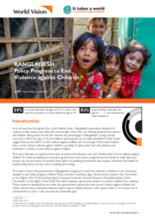As in all countries throughout the world, children living in Bangladesh experience situations of violence in their homes and within the communities where they live. Despite governments, citizens and children taking action to end this violence, the percentages of Bangladesh’s young women who marry before the age of 18 and children reporting the use of violent discipline in their homes suggest that current efforts to end violence against children are not enough. World Vision believes that a world without violence against children is possible. It takes action from all members and institutions in society to end violence against children.
This report focuses on a government’s duty to ensure that all actors can and will take action to end violence against children. To create an enabling environment, government must ensure a legal framework based on child rights and employ services and actors to protect those rights. An enabling environment also requires conditions favourable to implementing those services, such as funding and strategy.
This report reviews the government of Bangladesh’s progress to create the minimum conditions in law and policy needed to end violence against children. These minimum conditions align with provisions stated in the Convention on the Rights of the Child and described in General Comment, General Measures of Implementation of the Convention on the Rights of the Child that clarify necessary government actions to protect children from violence. These minimum standards do not mean that governments cannot do more to end violence against children, but rather, without these critical, foundational steps, it cannot enable all actors, within government, in civil society and in communities, to work in unity towards this achievable goal.

